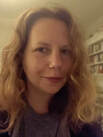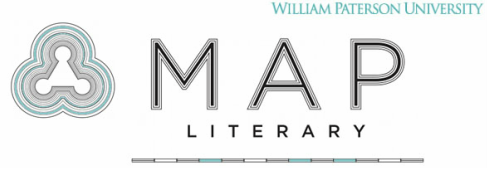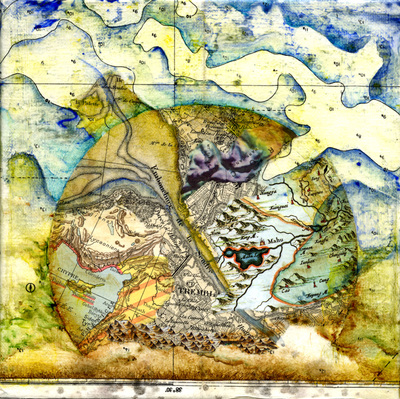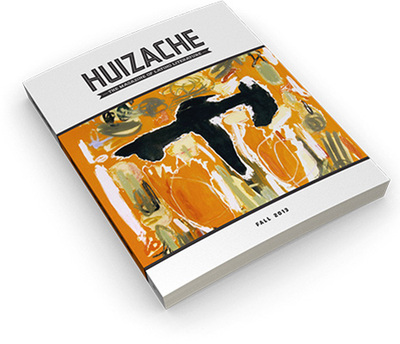ANNA MANTZARIS
Strange Magic
Things were strange. It started the day she met Freddie. They saw one another on the city bus and got off at the same stop. Anyone walking by would have assumed they knew each other. They were instantly involved in conversation like old friends. Or more. Standing too close to one another in front of a Brazilian restaurant. They walked in and sat in the airy space that was quiet at 3:13pm, talking about books and movies and their lives over strong coffee.
Her first thought about Freddie when they sat down was how great looking he was. She had never met someone with brown hair that filtered so much light. His observation about her was, “You seem like a really helpful person,” which is what he said when she asked if he wanted sugar and cream and got them extra napkins. She would have preferred he said she was pretty or smart or funny, or that she looked like a young Sophia Loren, which she knew wasn’t true, but she guessed helpful wasn’t so bad.
It was nearing dark when she got back to her apartment after they’d spent three hours talking, leaving only because the dinner rush was becoming noticeable and how much coffee could they have.
She lived on the bottom floor of a Victorian. And when she walked in the front door, the first thing she saw was the coffee table hovering in the center of the living room. She stepped closer to the oak piece of furniture she had bought at a flea market and all four legs were inches off the rag-rug. She was confused and watched it float for minutes until it slowly descended to the ground. She wondered if it had something to do with earthquakes. Or, she thought, maybe there could be heat emanating from the floor causing the table to rise, but when she placed her palms down on the rug, it was cool.
She wondered if she’d imagined it. She had consumed six mugs of hot Brazilian coffee. Or maybe it was her eyesight. It had been getting worse, but she refused to see an eye doctor because she didn’t want glasses. Freddie had told her he’d just gotten glasses, and when he pulled them out, she couldn’t believe he was even better looking with the tortoise shell rims shaping his lovely face.
“I feel too young for these,” he said, “but I spend a lot of time reading.”
“At the zoo?” she asked.
“Well, I don’t actually work with the animals,” he said. “I’m more of a behind-the-scene’s guy.”
He seemed to her like the kind of person who should be front and center, but she nodded. It was the same bob of her head she gave when he said he didn’t know how long he would be living in the city because his job was temporary. She reminded herself she was just happy to have a new friend in a place that was small but could feel so big.
The next time she saw Freddie was at his place. He had invited her over to his third-story walk- up on the other side of town and showed her a series of sculptures he had made out of wire coat hangers. She hadn’t told him that she also made sculptures out of wire coat hangers. His miniature chair-like pieces that twisted up and around looked very much like the ones she worked on most weekends.
They spent the afternoon talking about folk art and silent films and how they both felt guilty a lot for no reason. When she was leaving, Freddie hugged her and said he had really enjoyed spending the day together. She told him she felt the same.
When she got home she stopped in the living doorway. The vintage sofa was elevated at least a half a foot in the air. And like the coffee table, it hovered as she quietly observed and wondered, before making a soft landing.
Later Freddie called. They spoke about how it was so clear that night you could see Jupiter, that kaiser rolls were both their favorite food. They both admitted that they thought that the steam that comes out when you drain pasta was actually a secret world of tiny clouds. As they talked she looked at the hanging Miró gallery poster in her bedroom. It was pulsing. The bright geometrical shapes looked like living organisms. She walked over and took a closer look. The print was a handful of inches off the wall.
Before they hung up, Freddie didn’t mention getting together again but she assumed she would hear from him.
Eight days went by and no word. That week she carefully walked around her apartment, checking the furniture and art but everything was affixed. A feeling of static was in the air. She had trouble moving things. First a book on her desk wouldn’t budge. Then her coffee mug on the kitchen table. Then a hairbrush on the dresser. She tugged and pulled hard to make them come loose. She brought the items close, checking to see if there was something that had made them stick, but nothing. She was late for work one morning when her shoes were stuck to the floor and she had to get a ruler to wedge underneath the soles to set them free.
On day nine she called Freddie but it didn’t go through. She imagined an invisible cord lost and tangled in space. She decided she would buy him a present and drop if off and make sure he was okay.
She went to the bookstore and found a little hand-bound notebook, just a few inches wide. Strange Magic was printed in Helvetica on the front.
She walked with it tucked in her coat pocket as a light fog began to roll in. When she got to Freddie’s building a woman was walking in ahead of her and held the door. In the seconds that she walked through the threshold she thought of all the things in the past week that she had wanted to tell him—how the shadow at 5pm was starting to leave a plaid pattern on her kitchen floor that she had traced with a pencil, that she had tasted the best fig she’d ever had, that she had seen a man walking five identical dogs!
Amelia. Yes, that is her name, started to climb the stairs thinking about how when she had met Freddie and introduced herself, he had slowly sounded out her moniker. Ahh-meel-yah and smiled. He had made it sound like the person she always wanted to be. Like someone interesting. And smart. Who maybe lived abroad and read lots of books and rode home on a bicycle with sunflowers in the basket.
She walked the three flights up to his apartment and saw the door was open. The first thing she noticed was that all the little chair sculptures were gone. And the bed. And the kitchen table. The studio was bare. She looked around thinking maybe he had left her a note. A sign. But there wasn’t anything.
She took out the small Strange Magic notebook and opened to a blank page. She took a pen out of her canvas bag and wrote:
Dear Freddie: I am happy to know you exist.
She put the notebook on the sill beneath the glass that was open a few inches. She gently pushed it towards the outer part of the window, knowing when the breeze picked up, it would fly out like an eager homing pigeon, gently making its way into the universe, pages flapping in the air like wings, before coming back again.
Her first thought about Freddie when they sat down was how great looking he was. She had never met someone with brown hair that filtered so much light. His observation about her was, “You seem like a really helpful person,” which is what he said when she asked if he wanted sugar and cream and got them extra napkins. She would have preferred he said she was pretty or smart or funny, or that she looked like a young Sophia Loren, which she knew wasn’t true, but she guessed helpful wasn’t so bad.
It was nearing dark when she got back to her apartment after they’d spent three hours talking, leaving only because the dinner rush was becoming noticeable and how much coffee could they have.
She lived on the bottom floor of a Victorian. And when she walked in the front door, the first thing she saw was the coffee table hovering in the center of the living room. She stepped closer to the oak piece of furniture she had bought at a flea market and all four legs were inches off the rag-rug. She was confused and watched it float for minutes until it slowly descended to the ground. She wondered if it had something to do with earthquakes. Or, she thought, maybe there could be heat emanating from the floor causing the table to rise, but when she placed her palms down on the rug, it was cool.
She wondered if she’d imagined it. She had consumed six mugs of hot Brazilian coffee. Or maybe it was her eyesight. It had been getting worse, but she refused to see an eye doctor because she didn’t want glasses. Freddie had told her he’d just gotten glasses, and when he pulled them out, she couldn’t believe he was even better looking with the tortoise shell rims shaping his lovely face.
“I feel too young for these,” he said, “but I spend a lot of time reading.”
“At the zoo?” she asked.
“Well, I don’t actually work with the animals,” he said. “I’m more of a behind-the-scene’s guy.”
He seemed to her like the kind of person who should be front and center, but she nodded. It was the same bob of her head she gave when he said he didn’t know how long he would be living in the city because his job was temporary. She reminded herself she was just happy to have a new friend in a place that was small but could feel so big.
The next time she saw Freddie was at his place. He had invited her over to his third-story walk- up on the other side of town and showed her a series of sculptures he had made out of wire coat hangers. She hadn’t told him that she also made sculptures out of wire coat hangers. His miniature chair-like pieces that twisted up and around looked very much like the ones she worked on most weekends.
They spent the afternoon talking about folk art and silent films and how they both felt guilty a lot for no reason. When she was leaving, Freddie hugged her and said he had really enjoyed spending the day together. She told him she felt the same.
When she got home she stopped in the living doorway. The vintage sofa was elevated at least a half a foot in the air. And like the coffee table, it hovered as she quietly observed and wondered, before making a soft landing.
Later Freddie called. They spoke about how it was so clear that night you could see Jupiter, that kaiser rolls were both their favorite food. They both admitted that they thought that the steam that comes out when you drain pasta was actually a secret world of tiny clouds. As they talked she looked at the hanging Miró gallery poster in her bedroom. It was pulsing. The bright geometrical shapes looked like living organisms. She walked over and took a closer look. The print was a handful of inches off the wall.
Before they hung up, Freddie didn’t mention getting together again but she assumed she would hear from him.
Eight days went by and no word. That week she carefully walked around her apartment, checking the furniture and art but everything was affixed. A feeling of static was in the air. She had trouble moving things. First a book on her desk wouldn’t budge. Then her coffee mug on the kitchen table. Then a hairbrush on the dresser. She tugged and pulled hard to make them come loose. She brought the items close, checking to see if there was something that had made them stick, but nothing. She was late for work one morning when her shoes were stuck to the floor and she had to get a ruler to wedge underneath the soles to set them free.
On day nine she called Freddie but it didn’t go through. She imagined an invisible cord lost and tangled in space. She decided she would buy him a present and drop if off and make sure he was okay.
She went to the bookstore and found a little hand-bound notebook, just a few inches wide. Strange Magic was printed in Helvetica on the front.
She walked with it tucked in her coat pocket as a light fog began to roll in. When she got to Freddie’s building a woman was walking in ahead of her and held the door. In the seconds that she walked through the threshold she thought of all the things in the past week that she had wanted to tell him—how the shadow at 5pm was starting to leave a plaid pattern on her kitchen floor that she had traced with a pencil, that she had tasted the best fig she’d ever had, that she had seen a man walking five identical dogs!
Amelia. Yes, that is her name, started to climb the stairs thinking about how when she had met Freddie and introduced herself, he had slowly sounded out her moniker. Ahh-meel-yah and smiled. He had made it sound like the person she always wanted to be. Like someone interesting. And smart. Who maybe lived abroad and read lots of books and rode home on a bicycle with sunflowers in the basket.
She walked the three flights up to his apartment and saw the door was open. The first thing she noticed was that all the little chair sculptures were gone. And the bed. And the kitchen table. The studio was bare. She looked around thinking maybe he had left her a note. A sign. But there wasn’t anything.
She took out the small Strange Magic notebook and opened to a blank page. She took a pen out of her canvas bag and wrote:
Dear Freddie: I am happy to know you exist.
She put the notebook on the sill beneath the glass that was open a few inches. She gently pushed it towards the outer part of the window, knowing when the breeze picked up, it would fly out like an eager homing pigeon, gently making its way into the universe, pages flapping in the air like wings, before coming back again.
Copyright © April 2024 Anna Mantzaris

Anna Mantzaris is a San Francisco-based writer. Her work has appeared in Ambit, The Cortland Review, McSweeney’s Internet Tendency, Necessary Fiction, New World Writing Quarterly, Sonora Review, Spry, and elsewhere. She is the author of the fiction chapbook Occupations (Galileo Press) and a short story prize winner for the 2023 Eyelands Book Awards. She teaches writing in the M.F.A. program at Bay Path University.









